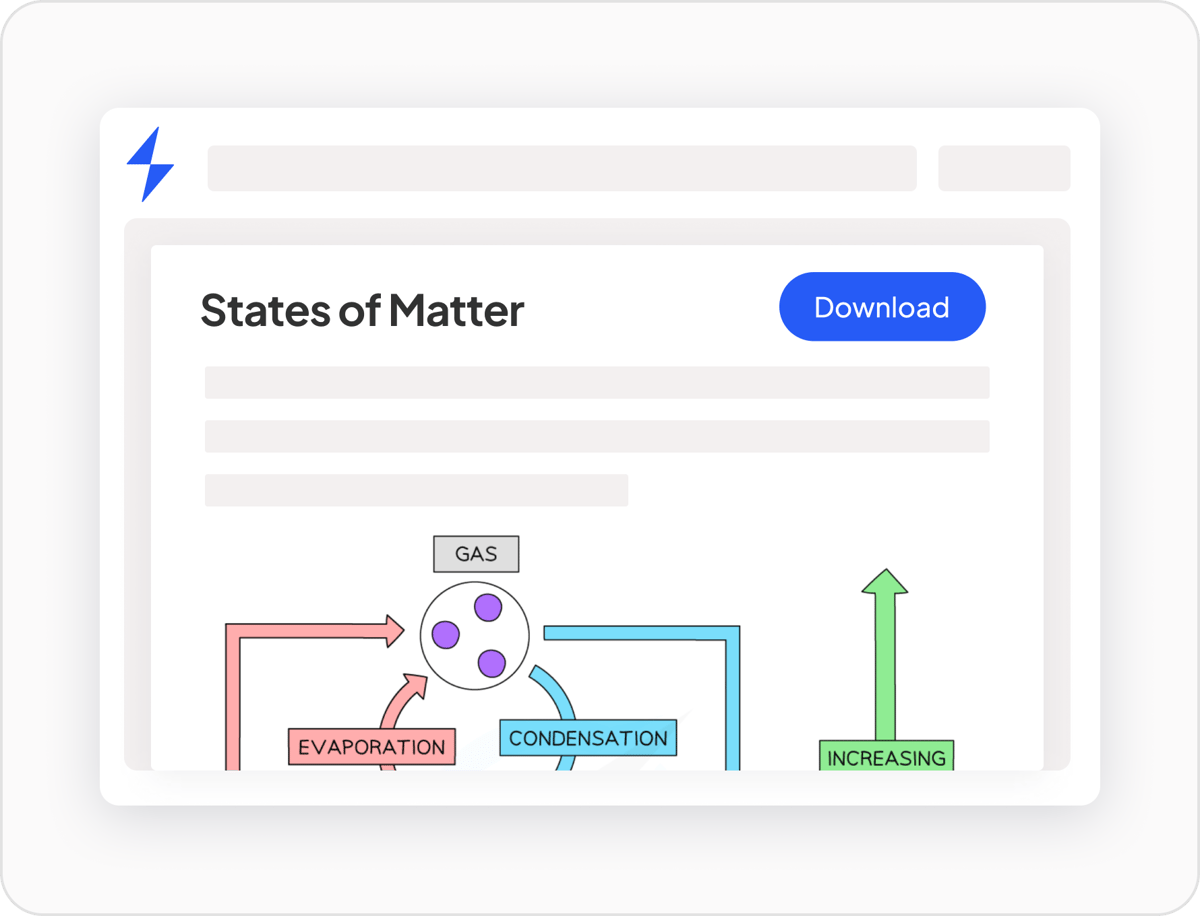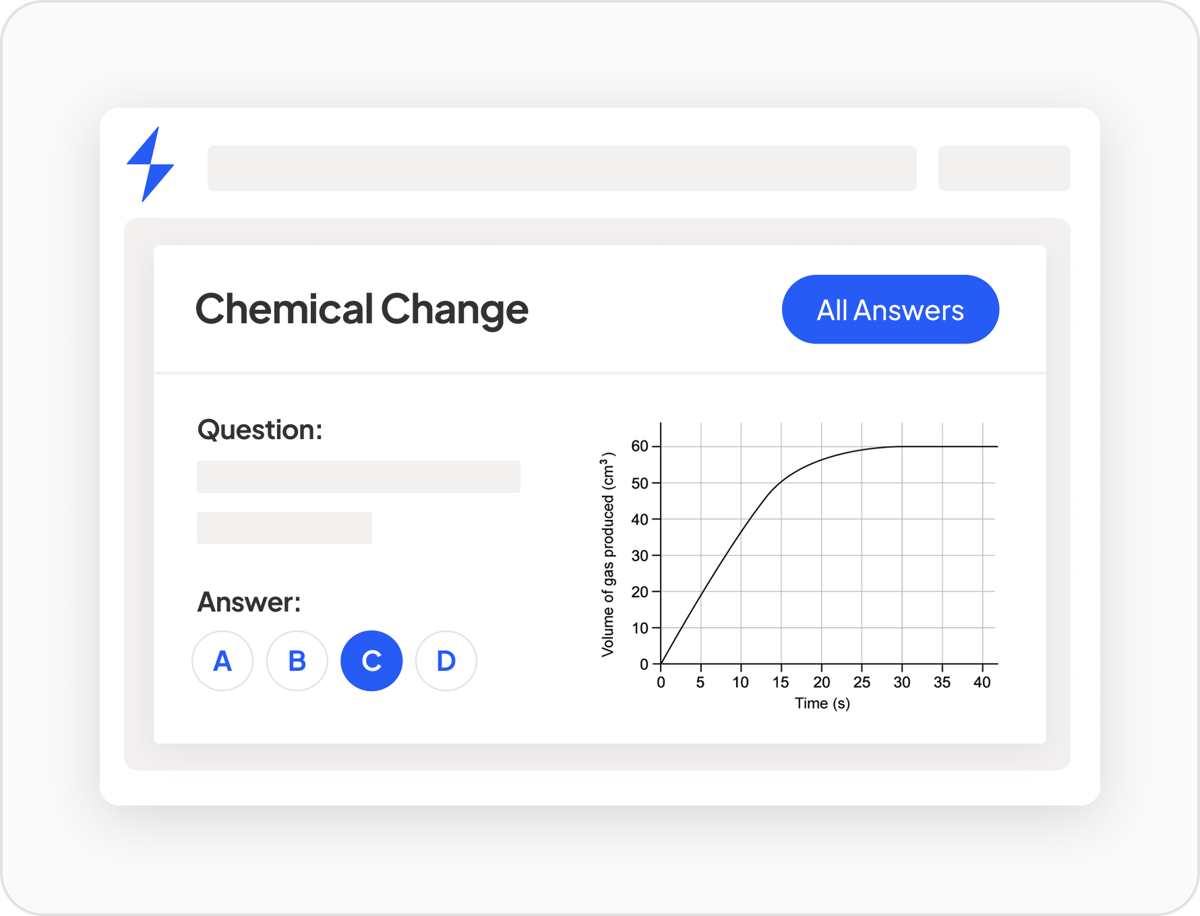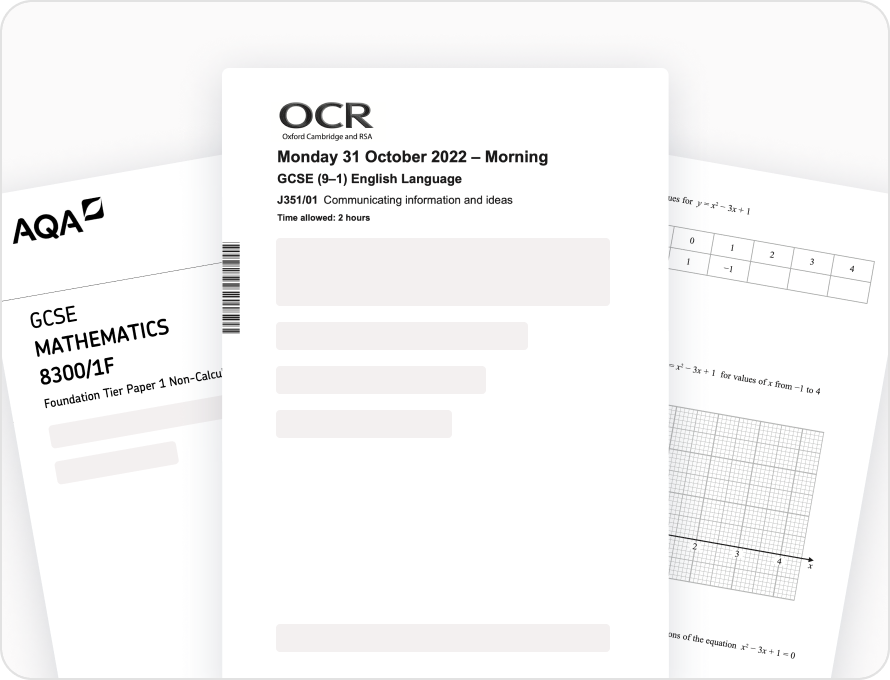GCSE Subjects
Biology
Choose your GCSE Exam Board
Business
Choose your GCSE Exam Board
Chemistry
Choose your GCSE Exam Board
Computer Science
Choose your GCSE Exam Board
English Language
Choose your GCSE Exam Board
English Literature
Choose your GCSE Exam Board
Food Preparation & Nutrition
Choose your GCSE Exam Board
Geography
Choose your GCSE Exam Board
Geography A
Choose your GCSE Exam Board
Geography B
Choose your GCSE Exam Board
Maths: Foundation
Choose your GCSE Exam Board
WJEC Eduqas Resources
Maths: Higher
Choose your GCSE Exam Board
WJEC Eduqas Resources
Physical Education (PE)
Choose your GCSE Exam Board
Physics
Choose your GCSE Exam Board
Psychology
Choose your GCSE Exam Board
Religious Studies (Short Course)
Choose your GCSE Exam Board
Religious Studies B
Choose your GCSE Exam Board
Sociology
Choose your GCSE Exam Board
Other
- Applied Science (Single Award)
- Arabic
- Art & Design: 3D Design
- Art & Design: Art, Craft & Design
- Art & Design: Art, Craft and Design
- Art & Design: Fine Art
- Art & Design: Graphic Communication
- Art & Design: Photography
- Art & Design: Textile Design
- Art & Design: Three-Dimensional Design
- Art, Craft & Design
- Astronomy
- Biology B (Twenty First Century Science)
- Chemistry B (Twenty First Century Science)
- Chinese
- Chinese (Spoken Mandarin)
- Citizenship Studies
- Classical Civilisation
- Combined Science B (Twenty First Century Science)
- Combined Science: Synergy
- Dance
- Design & Technology
- Design & Technology: Product Design
- Digital Technology
- Drama
- Economics
- Electronics
- Engineering
- English Language 2.0
- Film Studies
- Food & Nutrition
- French
- German
- History
- History A
- History B (Schools History Project)
- History: Ancient History
- Italian
- Latin
- Maths
- Maths & Numeracy (Double Award)
- Maths Numeracy
- Media Studies
- Music
- Physics B (Twenty First Century)
- Polish
- Portuguese
- Religious Studies
- Russian
- Spanish
- Statistics
- Turkish
- Urdu
- Welsh Language
- Welsh Second Language
GCSE revision tools
At Save My Exams, we provide expert-created Revision Notes, Exam Questions & Answers, Past Papers, Flashcards and more, all tailored to help students learn efficiently and boost their grades. Our resources simplify complex topics, build confidence and make exam preparation stress-free.

GCSE Revision Notes
Boost your understanding of complex topics with our expert-written GCSE revision notes. Covering exactly what you need to know for your specific course, our revision notes are jam-packed with examiner tips, worked examples and engaging visuals to help fill any knowledge gaps.
Read more
GCSE Exam Questions
Tackle realistic, exam-style questions, organised by topic and difficulty. Mix question types to mimic real GCSE exams, and grade your answers with our mark schemes and model answers. Easily pinpoint mistakes and identify your strengths and weaknesses.
Read more
GCSE Flashcards
Test your memory with our interactive GCSE flashcards. Revise key terms, definitions and phrases through active recall, making revision engaging and effective. Easily sort cards into ‘I know this’ and ‘Still learning’ piles so you can focus on what matters.
Read more
GCSE Mock Exams
Master your exam technique with our full-length mock exams, designed to replicate your real GCSE exams and match the exact exam board specifications. Perfect your timing and receive instant feedback with our AI-powered Smart Marking for select subjects, so you can accurately predict your grade.
Read more
GCSE Smart Mark
Our AI marking tool provides instant, exam-specific feedback on exam questions by comparing your answers to the official mark scheme. Developed and validated by experienced educators, Smart Mark offers 69% greater accuracy than generic AI tools, helping you identify areas for improvement and achieve higher grades.
Read more
GCSE Past Papers
Get instant access to GCSE past papers, sorted by subject, year and exam board. You’ll find everything in one place — including past papers, mark schemes and model answers. Practise exam questions and track your progress to boost your confidence.
Read moreGot questions?
We’ve got answers
How do I use Save My Exams resources for GCSE revision?
Save My Exams makes GCSE revision simple and effective. Start by choosing your subject and exam board to access expertly-written revision notes, exam-style questions and topic-specific flashcards. Practise with real past papers, test yourself with our Smart Mark tool for instant feedback and track your progress as you go. Whether you're revising key concepts or preparing for your GCSE mock exams, every resource is designed to match your syllabus and boost your confidence for exam day.
Can I practise GCSE exam questions by topic?
Yes! With Save My Exams, you can easily practise exam-style questions sorted by topic and difficulty level. Each question mirrors real exam formats and is tailored to your exam board.
Choose your topic and gradually progress from ‘Easy’ to ‘Very Hard’ questions, building confidence as you go. Perfect for targeted revision, you’ll also get mark schemes and model answers to see exactly how to improve.
How do Save My Exams' GCSE revision notes help with exam prep?
Our GCSE revision notes break down complex topics into clear, easy-to-understand summaries tailored to your exam board. Experienced teachers, examiners and subject experts write our revision notes, so they’re filled with examiner tips, helpful diagrams and key definitions to get you exam-ready. They’ll help you focus on exactly what you need to know for your GCSE exams.
How to revise for GCSEs
Revising for your GCSEs is easiest when you use the right tools and prioritise tried-and-tested revision techniques like active recall and spaced repetition.
Instead of just rereading notes, test yourself regularly with flashcards, practise past papers and use mark schemes to check your understanding. Save My Exams makes this easy by providing exam-style questions, clear revision notes and AI-powered feedback, helping you focus on weaker areas. The key is to stay consistent, track your progress, and make your revision as engaging as possible.
Our Learning Hub is full of expert revision tips and advice from experienced GCSE teachers who know exactly what it takes to achieve the best results in your GCSE exams.
Why it works

Revise
only what you need toEnjoy the relief and reassurance that every revision guide is written specifically for that syllabus so you only revise what you need to know.
“Never felt so relieved in my life”
“Quite literally has saved my exams on multiple occasions”

Test yourself
and check progressFeel empowered and confident going into exams knowing that you’ve covered all the topics and have a greater understanding of each subject.
“The tailored level of questions builds so much confidence within my students”

Improve
answer by answerGain certainty that you’re answering questions that get maximum marks, from model answers for every question, explained by an expert examiner or teacher.
“I went from a 6-7-7 in Year 10 to 9-9-9 for my real exams, only because of your superb resources”
Leverage the knowledge and expertise of
40+ examiners and educators
With Save My Exams, your revision resources are created by experienced educators and examiners who actually mark GCSE exams, so you’ll know exactly what to revise and how to answer questions for maximum marks.

Here’s what our experts say about getting ready for your GCSE exams


You’ll have a lot to remember when studying for your GCSEs so start early... little and often is much more beneficial than last minute cramming.
Head of STEM


Mnemonics and acronyms can be a great way to remember lists or long processes, especially if they are funny.
Biology Expert
GCSE students love Save My Exams
100,000 students, teachers, tutors and parents trust Save My Exams because it delivers real results.
“Excellent GCSE revision”
Daughter found this very useful for science GCSE revision and she got very good results! The customer support is also really excellent. I had an account query that was dealt with promptly and efficiently.
Karen G, Parent
“Very good website and resources”
Very good website and resources. Well structured, organized, and easy to use. The revision that led me to all 9s at GCSE and 3A* at A-level was made smoother with the structuring and layout of resources in one place that SME provided.
Revanth R, GCSE Student
“A must for GCSE and A levels!”
It’s a great resource with good revision material and allows students to test themselves on each topic and understand the mark schemes. This is particularly important if you need high grades. All 3 of my kids have used it to support GCSE and A levels.
Mrs Schofield, Parent